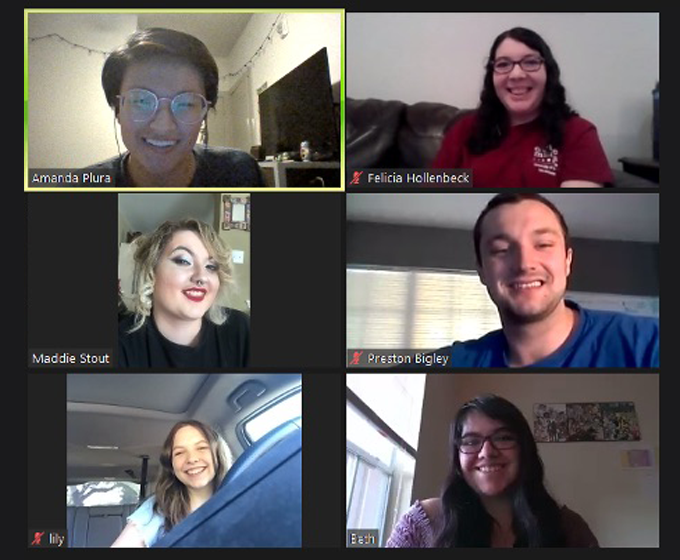Posted on October 1, 2020 by Amanda Cerreto

Officers for UTSA’s Active Minds chapter meet via Zoom. The chapter consists of 130 Roadrunners who hold regular virtual meetings discussing topics like eating disorder awareness, depression, and anxiety.
OCTOBER 2, 2020 — UTSA is committed to student success by building a strong foundation for healthy living for students, faculty and staff. Psychological and emotional health are important components of a student's wellbeing. At UTSA, Counseling and Mental Health Services (CMHS) and student advocates are providing a vast array of support services to help students maintain a healthy wellbeing, especially during the pandemic.
"In these high-stress times, students may be experiencing an inordinate amount of stress and anxiety as they navigate online learning, personal and family safety, financial concerns and equity and social justice issues" said Melissa F. Hernandez , director of Counseling and Mental Health Services.
In its commitment to the wellbeing of the campus community, UTSA has initiated several new programs designed to support students' overall wellness while managing virtual learning. The CMHS recently launched an online module which, emphasizes the importance of psychological and emotional wellbeing for student success and offers resources for students to address their mental health and self-care.
"During the pandemic, students may also be struggling with depression, sadness and other mood concerns from being disconnected from their social networks, being isolated, and the loss of the college experiences they expected," said Hernandez.
To address these concerns, the CMHS team provides a variety of service options for students including live online group counseling, skills-building workshops, as well as individual phone and video teletherapy. The CMHS office is open and drop-in consultations are available. Students who are not sure if they want to commit to treatment with a counselor can try TAO , the free online self help platform.
Students also have access to a free mobile app called Thrive at UT. It covers topics such as purpose, gratitude, mindset, self-compassion, thoughts, mindfulness, moods, and community. It also includes tips, push notifications, and exercises to help students engage in their wellbeing.
CMHS also offers Campus Connect , a suicide gatekeeper training for faculty, staff and students consisting of an in-person or live online course that teaches individuals to recognize distress and refer for help. A new integrated outreach team with staff members from Student Health Services and Counseling and Mental Health Services is working to expand outreach and education opportunities on wellbeing for students, faculty and staff.
“We cannot do this work alone, so we welcome partners who would like to collaborate on events and programs related to mental health and wellbeing,” Hernandez emphasized.
UTSA's efforts to enrich campus wellbeing is gaining support from its students. The Active Minds chapter at UTSA includes about 130 Roadrunners who hold regular virtual meetings discussing topics like eating disorder awareness, depression, and anxiety. Elaina Suarez , a senior majoring in psychology and sociology, is president of the UTSA chapter.
“Active minds are about stimulating positive communication about mental health, ‘it's okay not to be okay' educating, raising awareness, advocating and building connections” said Suarez.
Over the summer, Suarez came up with the idea of doing a series of Zoom presentations titled “Socially Closer.” The series was tailored to address students' concerns of feeling lonely during the pandemic.
“You can't be with your loved one, but you tend to be more alone than ever. I noticed that can have a negative impact on people,” Suarez said. “I was worried people would feel alone because of the pandemic and not feel close, so I came up with the idea of a series to tackle this very important current issue.”
The student organization collaborated with CMHS on the series. Counselors attended the presentations to help answer students' questions.
This semester, Active Minds activities are centered on self-love. The organization plans to conduct dialogues on what students are currently going through using Google forms as an anonymous system, emphasizing the importance of social connection. The group also is planning virtual socials like movie nights, drawing, and group journaling.
“I think it's very important for people to be understanding of other people,” Suarez added. “This organization is a great foundation to jointly build that connection. We are a family. We are a group that promotes peer-to-peer dialogue, discussing things that happened in life regarding mental health. We are like-minded students talking to other students in need.”
The group is in the process of creating another series called “Here For You” with topics about how to study, mental illness during a pandemic, social anxiety, sleep disorders, and domestic abuse among others. UTSA students will have the opportunity to present and give their testimonies.
The purpose is to tackle topics that are currently affecting students during this pandemic, such as the social pressure to be such happy all the time. “Providing support for students during such a pivotal time in their college experience has to be multi-dimensional and easy to access,” said Hernandez. “Our various service delivery methods make it easier for students to build new skills, access our services, or learn more about self-help.”
Students can get immediate assistance by calling the CMHS office at (210) 458-4140 (option 2) to get started. Students also have access to a 24/7 crisis helpline at (210) 458-4140 (option 3).

